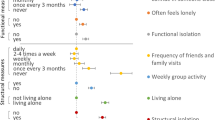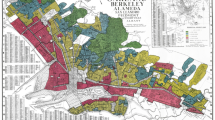Abstract
In studies on social capital and health, trust is usually treated as a one-dimensional, rather than a multidimensional, conception. Based on the data from the Chinese General Social Survey of 2010, which included 3866 cases, this study examined the associations between four trust forms and two health outcomes through hierarchical linear models in urban versus rural China. Results showed that at the individual level, general trust was positively related to rural residents’ physical health and urban residents’ psychological health; institution trust was positively associated with psychological health in both urban and rural China but negatively related to urban residents’ physical health; weak-tie trust brought more psychological health for both urban and rural residents, but intimacy trust was only positively associated with the psychological health of urban residents. At the county level, general trust had a detrimental effect on rural residents’ physical health, whereas institution trust had a detrimental effect on urban residents’ psychological health. Living in a county with more weak-tie trust, individuals with less weak-tie trust were less likely to be healthy. Therefore, sufficient healthcare and education resources are needed to be supplied, especially in rural China, to exert the positive effect of various trust forms on health.
Similar content being viewed by others
References
Abbott, S., & Freeth, D. (2008). Social capital and health: Starting to make sense of the role of generalized trust and reciprocity. Journal of Health Psychology, 13(7), 874–883.
Adler, N. E., & Newman, K. (2002). Socioeconomic disparities in health: Pathways and policies. Health Affairs, 21(2), 60–76.
Campos-Matos, I., Subramanian, S. V., & Kawachi, I. (2016). The ‘dark side’ of social capital: Trust and self-rated health in European countries. European Journal of Public Health, 26(1), 90–95.
Carlson, P. (2016). Trust and health in Eastern Europe: Conceptions of a new society. International Journal of Social Welfare, 25(1), 69–77.
Chan, D. K. C., Hamamura, T., Li, L. M. W., & Zhang, X. (2017). Is trusting others related to better health? An investigation of older adults across six non-western countries. Journal of Cross-Cultural Psychology, 48(8), 1288–1301.
Chanley, V. A., Rudolph, T. J., & Rahn, W. M. (2000). The origin and consequences of public trust in government: A time series analysis. Public Opinion Quarterly, 64(3), 239–256.
Chemaitelly, H., Kanaan, C., Beydoun, H., Chaaya, M., Kanaan, M., & Sibai, A. M. (2013). The role of gender in the association of social capital, social support, and economic security with self-rated health among older adults in deprived communities in Beirut. Quality of Life Research, 22(6), 1371–1379.
Chen, H., & Meng, T. (2015). Bonding, bridging, and linking social capital and self-rated health among Chinese adults: Use of the anchoring vignettes technique. PLoS One, 10(11), e0142300.
Chen, Z., Xie, B., & Ding, C. (2012). Chinese style resource curse with the viewpoint of dual-track system. Science Research Management, 33(8), 153–160.
Delhey, J., Newton, K., & Welzel, C. (2011). How general is trust in "most people"? Solving the radius of trust problem. American Sociological Review, 76(5), 786–807.
Engbers, T. A., Thompson, M. F., & Slaper, T. F. (2017). Theory and measurement in social capital research. Social Indicators Research, 132(2), 537–558.
Fei, X., 2007. Rural China. Shanghai People‘s Publishing House, Shanghai.
Feng, Z., Vlachantoni, A., Liu, X., & Jones, K. (2016). Social trust, interpersonal trust and self-rated health in China: A multilevel study. International Journal for Equality in Health, 15, e180.
Ferlander, S. (2007). The importance of different forms of social capital for health. Acta Sociologica, 50(2), 115–128.
Fukuyama, F. (1995). Trust: The social virtues and the creation of prosperity. Fress Press Paperbacks.
Gilson, L. (2003). Trust and the development of health care as a social institution. Social Science & Medicine, 56(7), 1453–1468.
Glanville, J. L., & Paxton, P. (2007). How do we learn to trust? A confirmatory tetrad analysis of the sources of generalized trust. Social Psychology Quarterly, 70(3), 230–242.
Glanville, J. L., & Story, W. T. (2018). Social capital and self-rated health: Clarifying the role of trust. Social Science Research, 71, 98–108.
Hu, A. (2014). Social participation, types of trust, and subjective wellbeing: Investigation based on CGSS2005. Journal of Social Sciences, 36(4), 64–72.
Hu, R., & Hu, K. (2008). The compositional differences of social capital between rural and urban areas. Journal of Xiamen University, 48(6), 64–70.
Jen, M. H., Sund, E. R., Johnston, R., & Jones, K. (2010). Trustful societies, trustful individuals, and health: An analysis of self-rated health and social trust using the world value survey. Health & Place, 16(5), 1022–1029.
Kawachi, I., & Berkman, L. F. (2000). Social cohesion, social capital, and health. In L. F. Berkman & I. Kawachi (Eds.), Social epidemiology (pp. 174–190). Oxford: Oxford University Press.
Kawachi, I., Kennedy, B. P., & Glass, R. (1999). Social capital and self-rated health: A contextual analysis. American Journal of Public Health, 89(8), 1187–1193.
Kawachi, I., Subramanian, S. V., & Kim, D. (2008). Social capital and health. In Springer. New York: New York Press.
Kennelly, B., O'Shea, E., & Garvey, E. (2003). Social capital, life expectancy and mortality: A cross-national examination. Social Science & Medicine, 56(12), 2367–2377.
Lin, N. (2001). Social capital: A theory of social structure and action. New York: Cambridge University Press.
Mansyur, C., Amick, B. C., Harrist, R. B., & Franzini, L. (2008). Social capital, income inequality, and self-rated health in 45 countries. Social Science & Medicine, 66(1), 43–56.
Meng, T., & Chen, H. (2014). A multilevel analysis of social capital and self-rated health: Evidence from China. Health & Place, 27, 38–44.
Mmari, K., Marshall, B., Lantos, H., & Blum, R. W. (2016). Who adolescents trust may impact their health: Findings from Baltimore. Journal of Urban Health, 93(3), 468–478.
Moore, S., Shiell, A., Hawe, P., & Haines, V. A. (2005). The privileging of communitarian ideas: Citation practices and the translation of social capital into public health research. American Journal of Public Health, 95(8), 1330–1337.
Nieminen, T., Prättälä, R., Martelin, T., Härkänen, T., Hyyppä, M. T., Alanen, E., & Koskinen, S. (2013). Social capital, health behaviors and health: A population-based associational study. BMC Public Health, 13, e613.
Novak, D., Suzuki, E., & Kawachi, I. (2015). Are family, neighborhood and school social capital associated with higher self-rated health among Croatian high school students? A population-based study. BMJ Open, 5(6), e07184.
Poortinga, W. (2006). Social capital: An individual or collective resource for health? Social Science & Medicine, 62(2), 292–302.
Putnam, R. D. (1995). Bowling alone: America's decline in social capital. Journal of Democracy, 6, 65–78.
Qi, Y. (2014). Reliability and validity of self-rated general health. Chinese Journal of Sociology, 34(4), 196–215.
Qi, L., & Wang, C. (2011). Health gradient and rural-urban disparity: An empirical study based on data from 9 provinces of China. Chinese Health Economics, 30(1), 11–13.
Riumallo-Herl, C. J., Kawachi, I., & Mauricio, A. (2014). Social capital, mental health and biomarkers in Chile: Assessing the effects of social capital in a middle-income country. Social Science & Medicine, 105, 47–58.
Rocco, L. (2014). Trust me, you will be in better health. Health Policy, 116(1), 123–132.
Snelgrove, J. W., Pikhart, H., & Stafford, M. (2009). A multilevel analysis of social capital and self-rated health: Evidence form the British household panel survey. Social Science & Medicine, 68(11), 1993–2001.
Steinhardt, H. C. (2012). How is high trust in China possible? Comparing the origins of generalized trust in three Chinese societies. Political Studies, 60(2), 434–454.
Subramanian, S. V., Kim, D., & Kawachi, I. (2002). Social trust and self-rated health in US communities: A multilevel analysis. Journal of Urban Health, 79(4), 21–34.
Szreter, S., & Woolcock, M. (2004). Health by association? Social capital, social theory and the political economy of public health. International Journal of Epidemiology, 33(4), 650–667.
Takeshi, H., Li, L. M. W., & Derwin, C. (2017). The association between generalized trust and physical and psychological health across societies. Social Indicators Research, 134(1), 277–286.
Taormina, R. J. (2013). Measuring trust in China: Resolving eastern and Western differences in concepts of trust, the third Asian conference of psychology and the behavioral sciences (pp. 2–11). Japan: Osaka.
Wang, P., Chen, X., Gong, J., & Jacques-Tiura, A. J. (2014). Reliability and validity of personal social capital scale 16 and personal social capital scale 8: Two short instruments for survey studies. Social Indicators Research, 119(2), 1133–1148.
Williams, S. L., & Ronan, K. (2014). Combinations of social participation and trust, and association with health status: An Australian perspective. Health Promotion International, 29(4), 608–620.
Woolcock, M. (1998). Social capital and economic development: Towards a theoretical synthesis and policy framework. Theory and Society, 27(2), 151–208.
Yan, Y. (1996). The flow of gifts: Reciprocity and social network in a Chinese village. San Francisco: Stanford University Press.
Yang, J., & Hu, R. (2016). Social capital and psychological health of urban and rural residents in China. Social Sciences in Yunnan, 36(1), 131–136.
Yip, W., Subramanian, S. V., Mitchell, A. D., Lee, D. T. S., Wang, J., & Kawachi, I. (2007). Does social capital enhance health and well-being? Evidence from rural China. Social Science & Medicine, 64(1), 35–49.
Zarychta, A. (2015). Community trust and household health: A spatially-based approach with evidence from rural Honduras. Social Science & Medicine, 146, 85–94.
Zhang, Y., & Jiang, J. (2018). Social capital and health in China: Evidence from the Chinese general social survey 2010. Social Indicators Research, in press.
Zhang, W., & Ke, R. (2002). Trust in China: A cross-regional analysis. Economic Research Journal, (10), 59–70.
Zhao, X., Wang, W., & Wan, W. (2017). Regional inequalities of residents' health level in China: 2003-2013. Acta Geographica Sinica, 72(4), 685–698.
Zhu, Y. (2003). Cultural analysis of the difference between urban and rural economic development in China. Probe, 19(3), 115–117.
Zhu, H., & Yao, Z. (2015). The impacts of social trust on urban residents' health. Urban Problems, 34(9), 94–98.
Author information
Authors and Affiliations
Corresponding author
Ethics declarations
Conflict of Interest
No conflict of interest exits in the submission of this manuscript, and manuscript is approved by all authors for publication.
Ethical Statement
There is no ethics approval for the data we use are public.
Additional information
Publisher’s Note
Springer Nature remains neutral with regard to jurisdictional claims in published maps and institutional affiliations.
Appendix
Appendix
Rights and permissions
About this article
Cite this article
Jiang, J., Li, Q., Kang, R. et al. Social Trust and Health: a Perspective of Urban-Rural Comparison in China. Applied Research Quality Life 15, 737–756 (2020). https://doi.org/10.1007/s11482-018-9686-0
Received:
Accepted:
Published:
Issue Date:
DOI: https://doi.org/10.1007/s11482-018-9686-0




